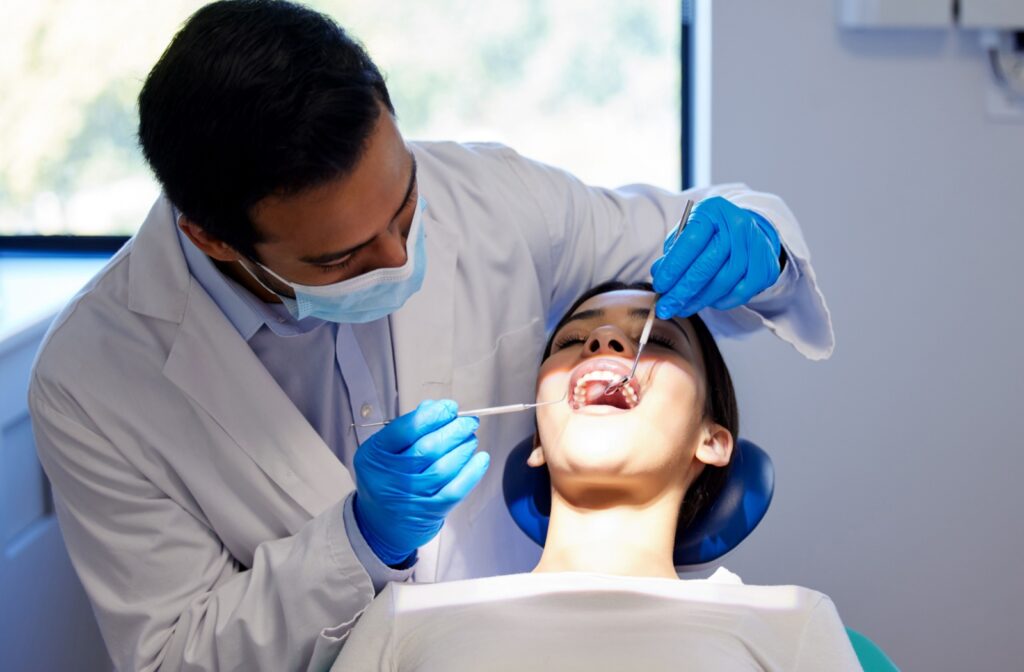The secret to a happy smile lies in regular visits to your dentist. A dental recall exam is essentially a routine appointment with your dentist 1 or 2 times annually that typically includes:
- A professional dental cleaning
- X-rays
- Thorough oral examination and assessment
- Tailored advice from your dentist
There could be some variances between your exams. For example, you may not need X-rays during every appointment, or the professional cleaning could take more or less time. The important thing to remember is that dental recall exams are a critical component of your overall oral healthcare plan.
Importance of Regular Dental Check-Ups
Regular dental check-ups are more than just routine cleanings—they’re essential for maintaining good oral health and preventing potential problems. Preventive care can save you time, money, and discomfort in the long run.
First, early detection of dental issues is one of the primary benefits of regular dental check-ups. Dentists can identify problems like cavities, gum disease, and even oral cancer at an early stage when they are easier and less expensive to treat.
Second, preventive care helps maintain oral hygiene. Your dental hygienist can clean your teeth, removing plaque and tartar that regular brushing and flossing don’t eliminate. This keeps your teeth looking great and prevents decay and gum disease.
Finally, regular check-ups allow your dentist to offer personalized advice tailored to your specific needs. They can recommend products or techniques to improve your oral hygiene routine, ensuring you maintain a healthy smile between visits.
How Often Should You See Your Dentist
According to the Ontario Dental Association, you should see your dentist for a dental recall exam at least once annually. But, depending on your unique situation, your dentist may recommend more frequent visits.
What to Expect During a Dental Recall Exam
Understanding what happens during a dental recall exam can ease anxiety about visiting the dentist.
Dental Cleaning
The first step usually involves a thorough cleaning by a dental hygienist. They use special tools to remove plaque and tartar from your teeth, especially in hard-to-reach areas. This process helps prevent cavities and gum disease.
X-Rays
X-rays are often taken to get a complete picture of your oral health. These images allow the dentist to see beyond the surface and identify any issues that aren’t visible to the naked eye, such as cavities between teeth or problems with the jawbone.
Oral Health Assessment
Your dentist typically examines your teeth, gums, and mouth during the oral health assessment. They can look for signs of decay, gum disease, and other potential issues. This assessment is crucial for catching problems early and planning appropriate treatments.
Personalized Advice
After the examination, your dentist will provide personalized advice based on your oral health. This may include recommendations for products, techniques for better brushing and flossing, and tips for maintaining a healthy diet that supports oral health.

The Role of Dental Recall Exams in Overall Health
Oral health is closely linked to overall health, and dental recall exams are crucial in maintaining both.
Connection Between Oral & Systemic Health
Research has shown that oral health is connected to systemic health. Conditions like gum disease are linked to heart disease, diabetes, and even respiratory issues. Regular dental exams can help detect and manage these conditions early.
Preventing Serious Health Issues
Maintaining good oral health through regular dental exams can prevent serious health issues. For example, controlling gum disease can reduce the risk of heart disease and stroke. During a routine exam, dentists can also spot early signs of other health problems, such as diabetes.
Boosting Overall Well-Being
Good oral health contributes to overall well-being. It can affect one’s ability to eat, speak, and socialize comfortably. Regular dental exams help keep one’s mouth healthy, supporting overall quality of life.
Tips for Maintaining Good Oral Health Between Recall Exams
Maintaining good oral health between dental recall exams is essential for keeping your smile bright.
Brush & Floss Daily
Brushing twice daily and flossing once daily are the cornerstones of good oral hygiene. Use a fluoride toothpaste and a soft-bristled toothbrush to clean your teeth thoroughly. Don’t forget to floss to remove plaque and food particles from between your teeth.
Eat a Balanced Diet
A balanced diet of fruits, vegetables, whole grains, and lean proteins supports oral health. Avoid sugary snacks and beverages, as they can contribute to tooth decay. Drinking plenty of water also helps keep your mouth clean and hydrated.
Use Mouthwash
Mouthwash can help reduce plaque, fight gum disease, and freshen your breath. Look for an antibacterial mouthwash that targets oral health issues and use it in your daily routine.
Avoid Tobacco Products
Tobacco products can cause a range of oral health issues, from bad breath and stained teeth to gum disease and oral cancer. If you use tobacco, consider quitting to improve your oral and overall health.
Book Your Next Dental Recall Exam
Dental recall exams are vital to maintaining good oral health and overall well-being. By scheduling regular check-ups, you can prevent potential issues, receive personalized advice, and ensure your smile stays healthy and bright.
Call us at Dentistry on Danforth today to request an appointment for your next recall examination. Our experienced team is here to help keep your teeth white and your mouth healthy.


